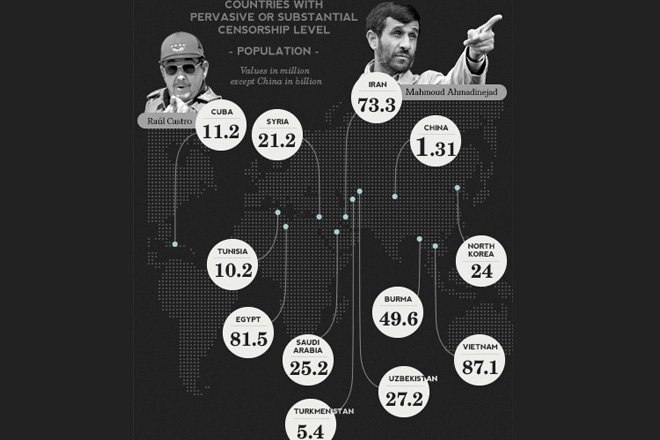1 in 4 world citizens are affected by web censorship
According to Reporters Without Borders' last annual report, 25,3% of the global population has potentially been subject to online censorship.
In about of web frustration you might be surprised to find your country isn’t in the list of the “oppressive 12″, i.e. the most censoring governments in cyberspace. This group includes the usual suspects: China, Iran, Cuba, North Korea and Burma are among the netizens’ worst enemies.
The OpenNet Initiative and Reporters Without Borders – in collaboration with Internet World Stats and Wolfram Alpha – released their annual report illustrating the governments which apply a “pervasive and substantial level” of internet censorship on their web users. The outcome is astonishing: at one time or another, 1.72 billion people have been potentially subject to online censorship. This figure equates to 25.3% of the global population.
According to Reporters Without Borders China, Vietnam, Iran, Syria, Egypt and Burma (Myanmar) are the countries in which censorship is applied as a form of repression against political opponents. Just as an example, 72 people have been imprisoned in China alone due to subversive activities within the online sphere.The arrest figures are still worrying in countries like Vietnam (17) Iran (13), Syria (4) Egypt and Burma (2). No data is available for North Korea.
Woorkup – a website that gathers blog posts on different issues including technology and web freedom – published an info-graph on the 27th which explicates such staggering figures.
In the 21st century panorama, it is increasingly clear that web freedom is inversely proportional to the despotic nature of a given government. According to another RSF report – “Living Dangerously on the net” published in 2003, China employed around 30000 civil servants with the sole purpose of policing internet providers. It is safe to say that seven years later this number has likely grown exponentially. Around 10,000 websites are restricted and the figures are set to rise.
In a response to the numerous accusations – possibly head-started by the withdrawal of Google at the beginning of this year – the Chinese government published a white paper on June 8 this year explaining and defending such strict control over online content and activities as a matter of national security.
In a move against this worrying trend, Reporters Sans Frontières has also announced on June 29 that it will open an “anti-censorship” shelter within Paris in partnership with the communications security firm XeroBank, which will feature an encryption software able to circumvent censorship , and will be connected online through an anonimity network. RSF also has plans to launch a website which will host any banned content, reminiscent of Wikileaks, the whistleblower portal lead by australian former hacker Julian Assange, that has been causing havoc for releasing confidential information on US army actions in Iraq, as well as private emails belonging to Sarah Palin’s personal account. An RSF spokesperson said
At a time when online filtering and surveillance is becoming more and more widespread, we are making an active commitment to an internet that is unrestricted and accessible to all by providing the victims of censorship with the means of protecting their online information
Crédits Photos ![]()
![]() by j / f / photos
by j / f / photos


Laisser un commentaire